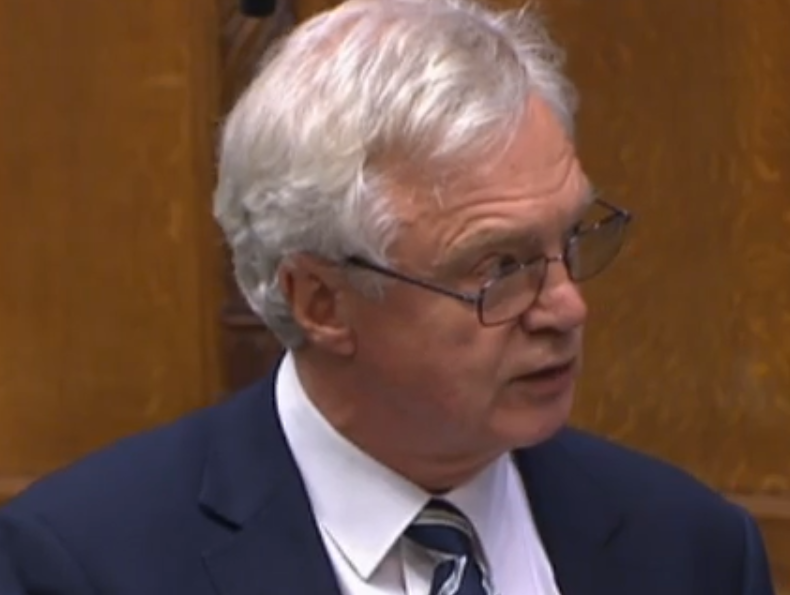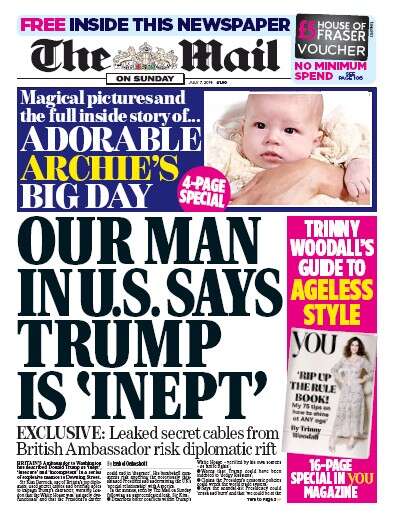
A Home Office minister has refused to deny in Parliament that police have been trawling through journalists’ phone data in response to leaked diplomatic memos about US President Donald Trump.
Conservative MP David Davis (pictured) tabled an urgent question in the House of Commons today after the Metropolitan Police said publishing information from such a leak may be a “criminal matter”.
The Met launched a criminal investigation on Friday to find the source of private correspondence sent by British ambassador to the US Sir Kim Darroch in which he refers to Trump as “inept” and “insecure”.
His comments made last week’s Mail on Sunday front page and prompted Trump to lash out on Twitter, forcing Sir Kim to step down.
Speaking in Parliament earlier, Davis asked for a minister to make a statement on the Home Office’s policy on police surveillance of journalists.
He also asked for reassurance that “intrusive surveillance techniques were not used against journalists in this case and that they would never be unless there was either a serious crime or a real and serious threat to national security”.
The former Brexit Secretary raised concerns over reports that police are using “the full force of the state” to pin down the source of the leak, analysing journalists’ mobile phone data, including location data showing where they have been for the past week.
“If true, this would be an astonishing intrusion on press freedom because it puts at risk every single confidential source they have, not just the one the police may be looking for,” Davis said.
Home Office Minister Nick Hurd responded by repeatedly stressing the Government’s “absolute commitment” to protecting the freedom of the press, although he declined to comment on any specifics of the case.
He said: “The Government agrees, indeed it forcefully advocates that confidential journalistic material and journalists’ interaction with their sources must be protected.
“But that does not mean that a journalist should receive blanket protection from legitimate investigation simply because of their chosen profession.
“Our security, and intelligence and law enforcement agencies will, in very limited circumstances, have a legitimate need to investigate a journalist or their source. But there need to be protections around that.”
Hurd added that the Regulation of Investigatory Powers Act 2000 “does provide strong protections in relation to the use of investigatory powers for the purpose of identifying or confirming a journalistic source and for the obtaining of confidential journalistic information”.
He said police must have approval from a Judicial Commissioner who agrees there is an “overriding public interest” before they can access a journalist’s phone data – the result of Press Gazette’s Save Our Sources campaign.

Top media lawyer Gavin Millar QC told Press Gazette yesterday the police “shouldn’t be going there” when it comes to pursuing news publishers over the leaked diplomatic memos.
Labour MP Afzal Khan spoke up in the Commons today to defend the rights of the press, asking: “Can it be right that the press is threatened for publishing material that is in the public interest?”
Khan added: “Surely it cannot be illegal to publish those remarks simply because they are the cause of embarrassment to the government. Surely it cannot be right that scanning technology has been used against journalists to investigate the leak.”
Last week the Foreign Office co-hosted the first global media freedom conference at which Foreign Secretary Jeremy Hunt “pledged to do what it takes – and no less – to ensure that instead of being silenced, the plural and varied voices of a free media are nurtured and encouraged”.
SNP politician Joanna Cherry said today it was “ironic” that this issue was being discussed just one week later, suggesting that the panel of legal experts being convened by Hunt to promote “best practice” for a free press “might be best starting close to home”.
Cherry added: “The SNP have made very clear that we deplore the diplomatic leaks as unacceptable and that they should be investigated however in times of crisis we need to remember that we must uphold human rights, particularly press freedom.
“I do wonder whether there were any official secrets in the ambassador’s leaked comments. It’s hardly a secret that Donald Trump is inept and the police really ought to understand that the Official Secrets Act is not there to protect the Government from embarrassment.”
Hurd declined to answer a subsequent question from Cherry about who escalated the investigation to the police.
“Wouldn’t they be better catching the leaker rather than shooting the messenger?” Cherry asked.
Former Culture Secretary John Whittingdale commended the organisation of last week’s media freedom conference, but said the UK “needs to be doing a lot more” to improve its World Press Freedom Index ranking of 33 out of 180 countries.
The concerns raised by Davis “make that harder to achieve”, he added.
Conservative MP Richard Drax asked why police had been brought in, saying the leak was embarrassing and nothing to do with national defence.
“As a former journalist myself of some 17 years we rely on sources, of course, to give the news to the public,” he said.
“If every time there’s a leak, and let’s face it there have been leaks before and there will be leaks afterwards… the police are going to be called in, then every journalist in the country is going to feel that their newsroom will be filled with officers in blue every time a story that potentially hurts someone in power is published.”
In response, Hurd said: “I understand the comments from the Met have generated ripples but this was a serious leak and I think it is entirely appropriate that the police should look at it seriously and I hope he will support me in wishing them every success in doing their job which is to find the leaker.”
A day after he asked “all owners, editors and publishers of social and mainstream media not to publish leaked government documents”, Met Assistant Commissioner Neil Basu seemed to backtrack.
In a follow-up statement he said the Met has “no intention of seeking to prevent editors from publishing stories in the public interest in a liberal democracy” but added that publication of such documents could constitute a criminal offence with no public interest defence.
Picture: Parliament TV
Email pged@pressgazette.co.uk to point out mistakes, provide story tips or send in a letter for publication on our "Letters Page" blog






